Mon 12 Apr 2010
Archived Review – DONALD CLOUGH CAMERON – Death at Her Elbow.
Posted by Steve under Authors , Bibliographies, Lists & Checklists , Crime Fiction IV , ReviewsNo Comments
DONALD CLOUGH CAMERON – Death at Her Elbow. Henry Holt; hardcover; 1940. Paperback reprint: Green Dragon #20, digest-sized, 1945 (abridged).
I don’t know about you, but until I read this book, Donald Clough Cameron was only a name to me. Using Hubin’s Revised Crime Fiction IV as a guide, here’s a list of the mysteries he wrote:
* Murder’s Coming. Holt, 1939.
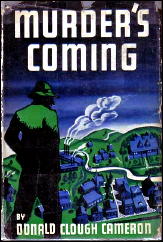
Death at Her Elbow. Holt, 1940.
* Grave Without Grass. Holt, 1940.
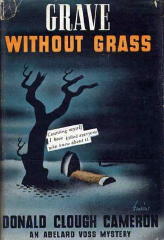
* And So He Had to Die. Holt, 1941.
Dig Another Grave. Mystery House, 1946.
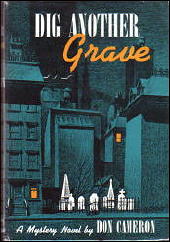
White for a Shroud. Mystery House, 1947.
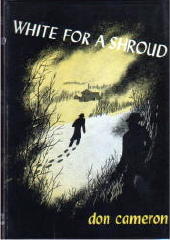
Those marked with a [*] are cases handled by one Abelard Voss, about whom at the moment I can tell you nothing. I did find an old Dunn & Powell’s mystery catalogue that contained the first two in jacket, the first for $175, the second for $75, but without spending the money, assuming the books were still available, that told me nothing more about Abelard Voss than I knew before. Except that Abelard Voss is a neat name for a detective.
Even the digest 1940s paperbacks are hard to come by, but they aren’t likely to cost you more than $10 to $20 each, if you were interested.
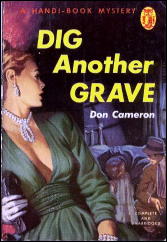
[At which point a light finally goes on in my head, and a small amount of time elapses here while I go rummaging around in some stacks of books I bought at the most recent New York City paperback show.]
And guess what. I’ve just discovered I own a copy of the aforementioned softcover version of Grave Without Grass, and inside the front cover is this description of Abelard Voss: “a unique young criminologist with the mind of a philosophic bloodhound.” Without reading further, he sounds like perhaps a young Philo Vance, and it only set me back a paltry $2.00 to obtain it.
But surely I digress. The detective in the one I did read, and which this review is nominally about, Death at Her Elbow, is Lieutenant Peter Gore, of the New York City homicide bureau. That’s mostly incidental, though, as the book focuses more on the actions of Miss Ann Potter and her at-arm’s-length boy friend and suitor, Alec Hunter, after her former fiance Paul Buell is found murdered in her apartment.
It’s one of those stories, in other words, in which each tries to confess to protect the other, and to clear themselves, they’re forced to solve the murder, with or without the assistance of the police.
Quoting from pages 110-111:
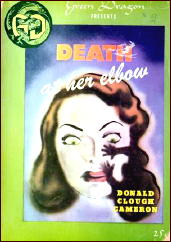
“It doesn’t matter, anyway,” she said. “They didn’t meet. Alec didn’t know Buell was around till after Buell had been killed.”
“By whom, Miss Potter?”
“Heavens, I’m not a detective. How should I know?”
“Who besides Hunter might have wanted to kill him?”
And here’s Gore some more, from page 115, still taking to Ann:
As a detective novel, the book’s only flaw is that there are so few suspects, as even one of the characters points out himself on page 168. For the armchair reader, it shouldn’t be difficult to run through the handful of possible perpetrators, pick out the one most likely to have done it, and go back over the crucial passages to determine — but, just in case you ever do read this book, I’ll stop here, just as a precaution.
Cameron’s no Christie, but on the other hand, who else can you think of who was?